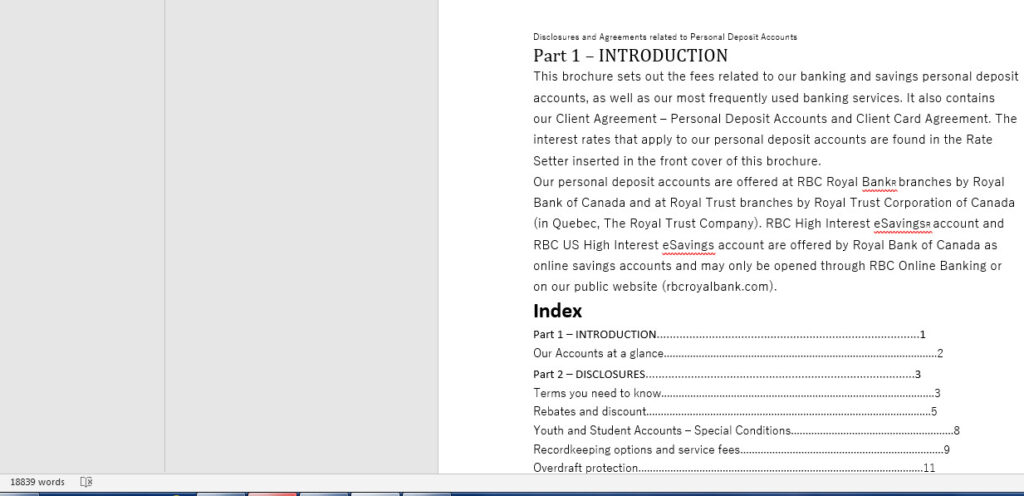Most every Canadian has at least one credit card or another. Whenever the new card, or any renewal card arrives, it comes with a 14,800 word booklet called the Cardholder Agreement. Yes, it’s almost 15,000 words (see the bottom left for the word count) – about the same as a paperback novel.


I also just looked through a Royal Bank chequing account disclosure agreement someone sent me. It comes it at just under 19,000 words! (Like credit card agreements, it’s not just this bank, they’re all pretty much the same length and content).


I’m quite sure that maybe one out of a hundred people actually flip through it, or actually read it. The font is so tiny, and the booklet is so thick, that people can be forgiven for just parking the booklet the same place their junk mail goes. And when you open a simple bank account, have you ever seen anyone stand there for an hour or two to read that 19,000 word agreement? Didn’t think so.
However, everything that you have a right to – or actually all the rights you don’t have are outlined in that agreement. So I did what other don’t: I read it and will translate the highlights for you. Mine is from Amex, but they’re pretty much all the same for every card issuer.
For both your bank accounts and credit cards, there are three main things you need to know:
Privacy: Here in Canada, all of our privacy laws apply. However, almost all agreements state that they may use contractors in other countries. That outsourcing means that you agree to be at the mercy of the privacy rules of that country…if they have privacy laws.
Cross collateralization: In your banking agreement, there is always a section that has you agreeing that your bank can use your money on deposit to pay any debts you owe them. If you have a credit card or line of credit and it’s in arrears, you’ve given permission for them to scoop up your money and apply it to what you owe them – no questions asked.
You can’t opt out: With mortgages or loans, you’re actually signing a whole lot of documents for the loan or mortgage. Not so with a credit card. When you get the account agreement, you’re not reading it, then signing it and sending it back. You automatically agree to be bound by all the terms and conditions if you use the card. In other words: Use the card the first time and that binds you to all the terms and conditions.
Other terms that you should know:
PIN number: You’re liable for charges – don’t share it with anyone – ever
Statements: If you don’t get a statement, you still owe a payment no matter what
Charges: You’re on the hook and owe the money. If you have a supplemental card, you’re the only one liable to pay it
Payments: They’re applied in a specific order: First all fees, late charges, etc., then interest, then optional insurances, and lastly to your balance
Who owns the card: It’ll always state that “the card is our property.” In other words, you get the use of it as long as they want you to have it
Privacy exceptions: All of them state that you consent to your information going to third-party suppliers and their agents and their service providers in order to do marketing.
Lost or stolen card: Common sense – contact them immediately. If you contact them within a day or two you’re not liable for any charges after the theft or loss of the card.
Changes: They have the total right to change any terms at any time. Yes, they’ll communicate them to you, but you are deemed to have accepted all the changes from rates to fees to minor things if you continue to use the card.
Default: There are lots of reasons to be in default – starting with arrears. If so, you’ll still be liable for any and all fees, interest, charges, etc., after the card is terminated
Perks: If you have a card with points, miles or whatever, there’ll be a long section outlining those. It’ll always state that these perks are from a third-party (such as Westjet, Aeroplan, Airmiles, etc.) and that they don’t come from your card issuer. They can be ended at any time without notice and it’s not your card issuers’ fault or liability – nor do they have or supply an information on your perks.
